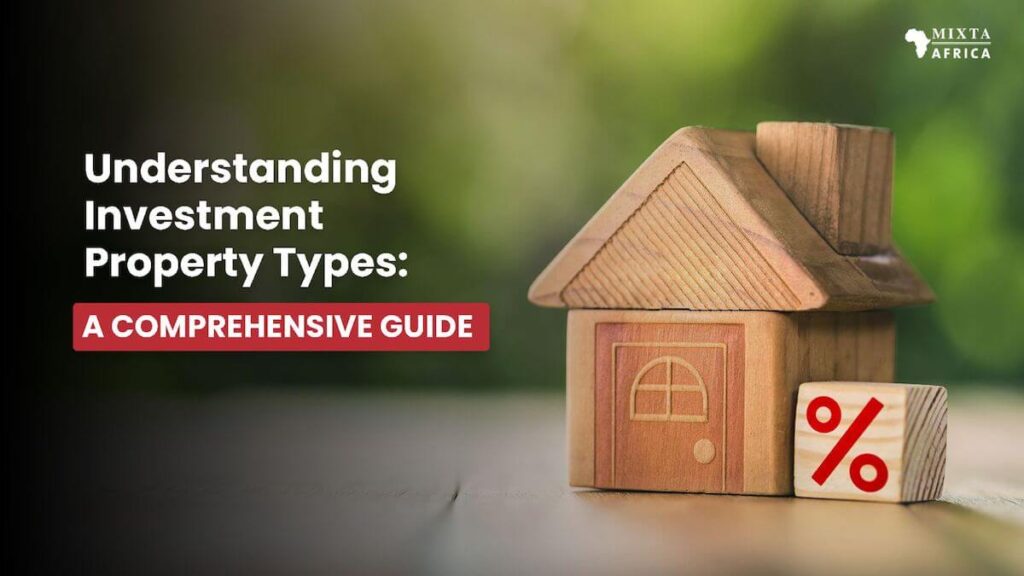Investment property types, at their core, are categories of properties that you, as an investor, can put your money into.
We have residential properties like single-family homes and apartments, commercial ones like office buildings and retail spaces, and even mixed-use properties that blend the best of both worlds. These, and more, form the landscape of real estate investment.
Now, why should you care about these property types? Why can’t you just invest in any pretty building that catches your eye?
Here’s the thing – each type of property has its own set of benefits and challenges, market dynamics, and tenant expectations. Understanding these differences will help you make informed decisions about where to put your money, depending on your personal goals and risk tolerance.
And let’s not forget about the potential benefits of investing in different property types. This is where things get really interesting. From generating a steady stream of rental income and diversifying your investment portfolio to potentially benefiting from property appreciation over time, the perks are certainly appealing.
What is an Investment Property?
An investment property is a piece of land or building (or both) that you purchase with the intention of generating a return on your investment. This return can come in two main forms: rental income and property appreciation.
Types of Investment Properties
- Residential Investment Properties
- Commercial Investment Properties
- Land Investment Properties
- Vacation Rental Investment Properties
- REITs (Real Estate Investment Trusts)
Residential Investment Properties
If there’s one thing everyone needs, it’s a place to call home. That’s what makes residential investment properties such a compelling prospect for investors. From quaint single-family homes to bustling apartment complexes, residential properties cover a broad spectrum of homes that individuals and families rent or own for habitation.
Characteristics of Residential Investment Properties
There’s something unique about residential properties that sets them apart from their commercial counterparts. For one, residential properties usually have more frequent tenant turnover. Leases typically last for a year, giving landlords the flexibility to adjust rent according to market conditions. But, more turnover also means more time and resources spent on finding new tenants.
Types of Residential Investment Properties
When it comes to residential real estate, variety is the spice of life. Here are a few types you might consider:
- Single-Family Homes: A standalone house meant for one family. It offers the privacy and independence that many tenants seek.
- Multi-Family Homes: Buildings like duplexes and triplexes fall into this category. Multiple families can reside here, leading to multiple streams of income from one property.
- Condominiums: Individual units within a larger complex. These offer a sense of community and shared amenities like swimming pools or gyms.
- Apartments: Large buildings with several individual units. Depending on the size of the complex, this could mean significant rental income.
Pros and Cons of Investing in Residential Properties
Just like any investment, residential properties come with their share of pros and cons.
Pros include:
- Affordability: Compared to commercial properties, residential ones are generally more affordable.
- High Demand: People always need a place to live, which makes the demand for residential properties relatively stable.
- Consistent Income: If your property is priced right and in a good location, it can provide a steady stream of rental income.
However, the cons are:
- Management Intensity: Frequent tenant turnover requires more active management.
- Vacancy Risks: There may be periods without tenants, which can impact your return on investment.
- Maintenance Costs: Residential properties require regular upkeep, which can eat into your profits.
Commercial Investment Properties
As we move away from the realm of residential properties, we find ourselves stepping into the buzzing world of commercial real estate. When we talk about commercial investment properties, we’re referring to buildings or lands intended to generate a profit from rental income or capital gain. These include spaces like offices, retail stores, warehouses, and more.
Characteristics of Commercial Investment Properties
Commercial properties come with their own unique set of characteristics. One key trait is the nature of the leases. Unlike residential leases, commercial ones tend to span over multiple years, providing a more stable and predictable income stream. However, these properties often require a higher initial investment than residential properties, making them a more substantial financial commitment.
Types of Commercial Investment Properties
Commercial properties offer an interesting variety for investors to explore:
- Office Buildings: These could range from small professional buildings to towering skyscrapers in city centers.
- Retail Spaces: These include standalone shops, large shopping centers, or malls. They’re designed to attract customers and drive business.
- Industrial Spaces: Warehouses, factories, and distribution centers fall into this category. They’re usually located outside city limits for space and logistical reasons.
- Mixed-Use Buildings: These properties offer a combination of residential, commercial, and sometimes industrial spaces in one building or complex.
Pros and Cons of Investing in Commercial Properties
Investing in commercial properties also comes with its advantages and disadvantages.
Pros include:
- Longer Leases: Commercial leases usually last for several years, providing a more predictable income.
- Potential for Higher Income: Commercial properties often yield higher returns on investment compared to residential properties.
However, there are also cons:
- Higher Initial Investment: Commercial properties usually cost more to buy than residential properties.
- Increased Liability Risks: Commercial properties come with additional legal considerations and liability risks.
- Dependent on Economic Conditions: The success of commercial properties is heavily linked to the overall health of the economy.
Land Investment Properties
So far, we’ve talked about properties with buildings – spaces created for people to live or work in. But what about the basic, the raw, the untouched? That’s right, we’re about to explore the world of land investment properties. Land investments involve purchasing a piece of land and making a profit from it, either through its resale, leasing for use, or developing it further.
Characteristics of Land Investment Properties
The land investment comes with its own unique features. Unlike residential or commercial properties, raw land doesn’t depreciate. It also doesn’t require any maintenance or management efforts. However, profiting from a land investment can take longer, especially if you plan to sell it at a higher price in the future.
Types of Land Investment Properties
Now, not all land is the same. Here are a few types of land investments:
- Undeveloped Land: This is a blank canvas. It could be a plot in a city waiting to be developed or a remote piece of land, far from current development.
- Agricultural Land: This type of land is used for farming or ranching. It can provide a steady income if leased to farmers or ranchers.
- Commercial Land: This is land designated for commercial use, like building a shopping center or office building.
- Residential Land: This land is destined to become a place for homes or apartments.
Pros and Cons of Investing in Land Properties
Land investment also has its own advantages and disadvantages.
On the plus side:
- Low Maintenance: Unlike buildings, land doesn’t require any upkeep.
- No Depreciation: Land, being a finite resource, tends to hold its value over time.
But there are also some downsides:
- No Immediate Income: Raw land won’t provide any immediate income unless it’s used for farming, parking, or a similar venture.
- Development Costs: Turning raw land into something profitable often requires a large investment.
Vacation Rental Investment Properties
These properties, often located in popular holiday destinations, provide short-term accommodation for travelers and can generate significant rental income, especially during peak tourist seasons.
Characteristics of Vacation Rental Investment Properties
Vacation rentals have some unique characteristics that distinguish them from other investment properties. The income from vacation rentals can be considerably higher than traditional rentals, given they’re usually rented out per night, similar to hotel rooms. However, these properties also experience seasonal demand fluctuations and may require more hands-on management, particularly when it comes to bookings and guest services.
Types of Vacation Rental Investment Properties
There are several types of vacation rental properties that can attract holidaymakers:
- Beachfront Condos: Offering stunning views and direct access to the beach, these properties are a hit among beach lovers.
- Mountain Cabins: These rentals provide a cozy retreat for those looking to enjoy mountainous landscapes, hiking, or winter sports.
- City Apartments: Ideal for city breaks, these properties attract tourists who want to explore urban environments.
- Country Cottages: Offering peace and quiet, these are perfect for those wanting a rural getaway.
Pros and Cons of Investing in Vacation Rental Properties
As with all investments, there are pros and cons when it comes to vacation rentals.
The pros include:
- Higher Income Potential: Vacation rentals can generate substantial income, especially during peak seasons.
- Personal Use: When not rented out, you can enjoy the property for your own vacations.
The cons, on the other hand, include:
- Seasonal Demand: The income from vacation rentals can be inconsistent, with peaks and troughs according to the tourist season.
- Intensive Management: Managing bookings, providing guest services, and ensuring high standards of cleanliness can be time-consuming.
REITs (Real Estate Investment Trusts)
REITs, or Real Estate Investment Trusts. These are companies that own, operate, or finance income-generating real estate. By buying shares of a REIT, investors can own portions of real estate and enjoy the profits they generate without having to buy or manage the properties themselves.
Characteristics of REITs
A REIT is essentially a company that allows individual investors to buy shares in commercial real estate portfolios that receive income from a variety of properties. These properties can range from apartment complexes and hospitals to cell towers and warehouses. A key characteristic of REITs is that they are required to distribute at least 90% of their taxable income to shareholders annually, making them attractive for investors seeking regular income.
Types of REITs
REITs come in different forms:
- Equity REITs: The most common type of REITs. They own and manage income-producing real estate.
- Mortgage REITs: These REITs lend money to real estate buyers or invest in existing mortgages or mortgage-backed securities.
- Hybrid REITs: As the name suggests, these trusts combine the investment strategies of equity and mortgage REITs.
Pros and Cons of Investing in REITs
Investing in REITs also has its own advantages and disadvantages.
Pros include:
- Accessibility: REITs allow individual investors to invest in large-scale real estate that would otherwise be out of reach.
- Liquidity: Unlike physical real estate, REIT shares can be bought or sold quite easily on the stock market.
- Income Potential: Since REITs are required to distribute most of their income to shareholders, they can provide a steady income stream.
Cons, on the other hand, include:
- Market Risk: Like any stock, the value of a REIT can go up or down depending on market conditions.
- Lack of Control: Investors don’t have control over the properties in a REIT’s portfolio.
- Tax Considerations: Dividends received from REITs are typically taxed as regular income.
Factors to Consider When Choosing an Investment Property Type
Location
It’s an old saying in the real estate world, but it holds true – location is paramount. The area where your property is located can impact everything from rental income to resale value. Proximity to amenities, the quality of local schools, crime rates, and potential for growth and development are all aspects to consider when looking at a location.
Budget
Your budget will significantly influence what type of property you can invest in. Remember, it’s not just the purchase price you have to consider, but also potential renovation costs, maintenance expenses, property taxes, and insurance. Each property type comes with its own set of financial requirements and considerations.
Market Conditions
Real estate isn’t immune to the economic laws of supply and demand. Understanding current market conditions can help you make an informed decision about when and where to invest. Factors such as interest rates, economic growth, unemployment rates, and housing demand can all impact the potential profitability of your investment.
Rental Income Potential
If you’re planning on renting out the property, it’s crucial to consider the rental income potential. This will depend on factors like rental rates in the area, occupancy rates, and the property’s appeal to potential tenants. Residential and commercial properties can generate regular rental income, while income from land and vacation rentals may be less predictable.
Appreciation Potential
While rental income can provide a steady cash flow, the potential for property appreciation can lead to long-term financial gain. This involves the property increasing in value over time, which could provide a significant return on investment when you decide to sell.
Financing Options for Investment Properties
Here are a few of the most common methods:
Traditional Mortgages
One of the most common ways to finance an investment property is through a traditional mortgage loan. You’ll typically need a solid credit score, a stable income, and a substantial down payment (usually 20-30% for investment properties). Traditional mortgages offer the advantage of relatively low interest rates and are ideal for long-term investments like residential or commercial properties.
Hard Money Loans
Hard money loans are a type of short-term financing, typically used when an investor needs to act quickly. They’re usually issued by private investors or companies, rather than banks, and are commonly used for fix-and-flip properties. While they provide quick access to cash and have less stringent eligibility requirements, hard money loans often come with higher interest rates compared to traditional mortgages.
Private Financing
Private financing involves securing funds directly from private lenders, which could include friends, family, or private investors. These agreements offer more flexibility, as the terms of the loan are typically negotiated between the two parties. However, this method requires a high level of trust between the lender and borrower and could potentially strain personal relationships if not managed properly.
Crowdfunding
Crowdfunding is a relatively new method of financing real estate investments. It involves pooling money from multiple investors, usually through online platforms. This method allows investors to participate in deals that they may not be able to afford on their own. However, these investments are often riskier, as they can be more difficult to cash out of compared to traditional investments.
Tips for Buying and Selling Investment Properties
Identifying Potential Properties
One of the first steps in real estate investment is identifying potential properties. This involves researching and understanding local real estate markets, as well as considering aspects such as location, the property’s condition, potential rental income, and appreciation potential. Tools such as online real estate marketplaces, networking with local real estate agents, or joining local real estate investment groups can be useful in spotting potential investments.
Analyzing the Potential Return on Investment
Once you’ve identified a potential property, it’s crucial to calculate the potential return on investment (ROI). This includes estimating potential rental income, costs such as mortgage payments, taxes, maintenance, and insurance, and the potential appreciation of the property. Remember, the aim is to ensure that the potential returns justify the investment and align with your financial goals.
Negotiating the Price and Terms of the Sale
Effective negotiation can be the key to securing a profitable deal. This requires understanding the market value of the property, knowing how long it has been on the market, and identifying any potential leverage points, such as necessary repairs or improvements. It’s also important to be prepared to walk away if the terms don’t meet your investment criteria.
Preparing the Property for Sale or Rental
Once you’ve purchased an investment property, preparing it for sale or rental is the next step. This could involve making repairs or improvements to increase its value, staging it to appeal to potential buyers or tenants, and setting a competitive price or rental rate. A well-maintained, appealing property can attract higher-quality tenants or buyers and potentially increase your return on investment.
Property Management for Investment Properties
Tenant Screening and Selection
Choosing the right tenants can significantly affect your investment’s profitability and your peace of mind. This process often involves conducting background checks, checking references, verifying income, and meeting potential tenants in person. Proper screening can minimize potential issues down the line, such as late payments or property damage.
Lease Agreements and Renewals
Understanding and effectively managing lease agreements is essential in property management. This includes setting fair and legal terms, ensuring that both parties understand their rights and responsibilities, and managing lease renewals. It’s crucial to stay updated on local and national housing laws to ensure your lease agreements are compliant.
Maintenance and Repairs
Regular maintenance and timely repairs not only keep your tenants happy but also preserve the value of your property. This involves everything from routine tasks like landscaping and pest control to managing more significant issues like plumbing or electrical repairs. While some property owners prefer to handle these tasks themselves, others may hire a property management company to handle them.
Rent Collection and Accounting
Effective rent collection and financial management are vital for maintaining a steady income stream from your investment. This involves setting clear payment terms, ensuring timely rent collection, and managing any late or missed payments. Additionally, accurately tracking income and expenses is crucial for tax purposes and understanding your property’s financial performance.
Start Your Investment Journey Using Mixtavest
Embark on your investment journey with Mixtavest, offered by Mixta Africa. Mixtavest provides an opportunity to invest in a variety of lands and homes.
With Mixtavest, you can explore different property types, such as residential and commercial developments, and unlock the potential for attractive returns. Trust Mixta Africa to guide you through your investment endeavors and help you make informed decisions in the world of real estate. Start investing with Mixtavest and seize the opportunities that await you in the market.
Conclusion
The world of real estate investment is diverse and dynamic, offering a wide range of opportunities. However, it’s crucial to stay informed about industry trends and market conditions. As the landscape evolves, continuous learning and adaptability become key to success.
Don’t hesitate to seek professional advice to navigate this complex field. You can reach out to us. Whether you’re just starting out or looking to expand your portfolio, expert guidance can provide valuable insights tailored to your unique situation.











